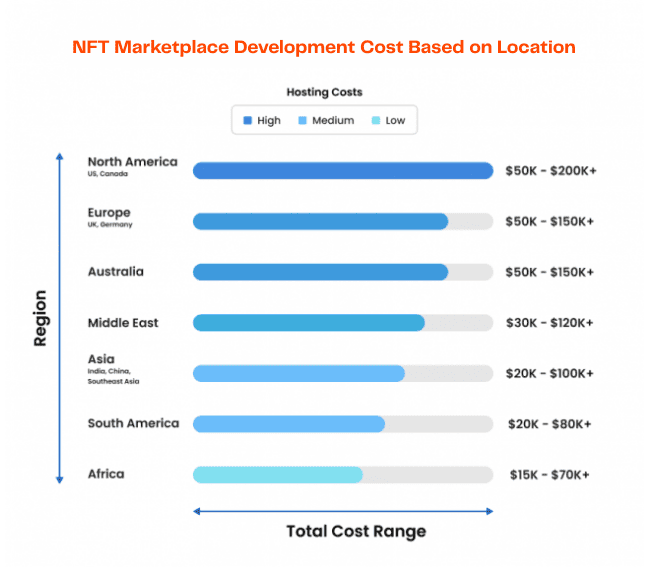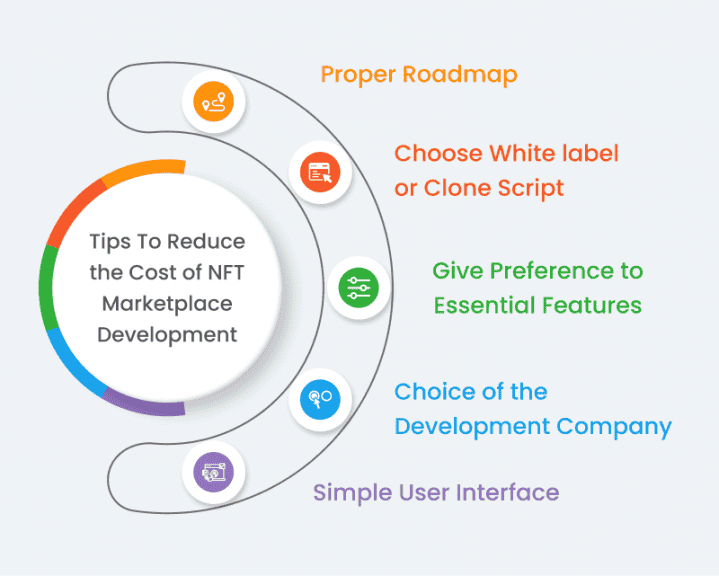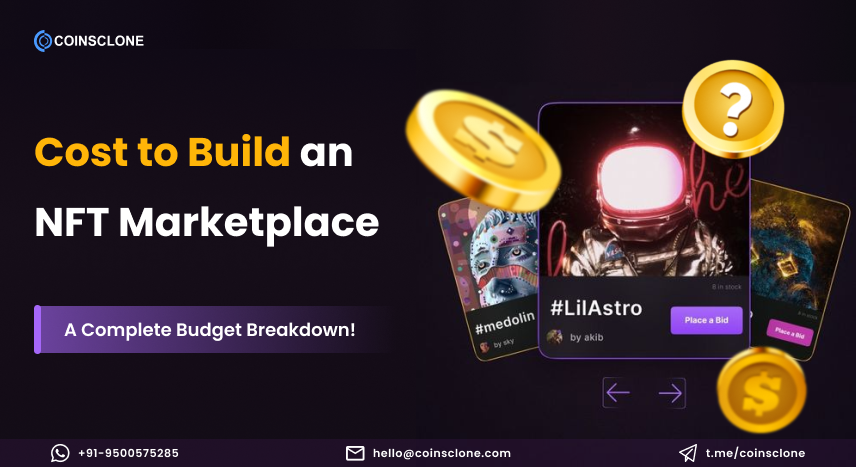Planning to launch your own NFT Marketplace? You’re definitely on the right track.
The NFT market has been swiftly growing. As the Business Research Company says, it will grow at a CAGR of 41.6 percent, from $43.08 billion in 2024 to $61.01 billion in 2025. The momentum is so strong that it will soar even higher to $247.41 billion by 2029, with a CAGR of 41.9%. That kind of momentum proves one thing: NFTs are transforming industries and turning ideas into valuable digital assets.
That is why businesses of all scales, from startups to established enterprises, are entering into the NFT space. They do not merely attempt to buy or sell NFTs; they want to create the platforms that will support this new digital economy. But before you jump into development, there’s one crucial aspect you need to know: the cost of NFT Marketplace development.
Therefore, if you have ever wondered what budget it takes to build an NFT marketplace in 2025, then this guide will cover it all for you. We have covered all aspects, from cost breakdowns to tips, on how to save money but never at the expense of quality.
So, now, the exact query that will be in your mind is…
Discover NFT Marketplace Development Cost and Launch Your Platform Smartly
NFT Marketplace Development — cost-efficient and reliable.
- Transparent Pricing : Get to know NFT marketplace development costs.
- Feature-Rich Solutions : Supports multi-chain, minting, bidding, and UI/UX.
- Brand & Customization : Your design, your tokens, your marketplace.
- Revenue Engine : Earn via trading fees, listings, and NFT drops.
See a free branded demo of your NFT marketplace in 48 hours — before you invest a cent.
Book a Free Demo to explore how understanding NFT Marketplace Development Cost can save you time and money while launching your platform in just 2–4 weeks.
What is the Exact Cost of NFT Marketplace Development in 2025?
In 2025, the NFT Marketplace development cost starts from $30,000 to $150,000, depending on the process of developing the method, the tech stack you select, and the features you integrate, etc. With proper guidance and a perfect road map, you can deliver a potential NFT Marketplace with enriched features.
Because the NFT Marketplace you create should be compatible with all the necessary upgrades and technical complications. Further, it should be able to withstand this competitive crypto market to establish your branding and business. So, the overall cost of your NFT Marketplace creation might differ depending on various factors. Here is the list of some major factors that influence the cost estimation of the NFT Marketplace for your reference.
Key Factors that Influence NFT Marketplace Development Costs
Development of the NFT Marketplace must be done with proper planning and guidance. The development process will be challenging and even risky, too. But, facing them would reap your success in the NFT Marketplace business. So, let’s see some of the necessary factors that influence the cost of developing an NFT Marketplace platform.
Type of NFT Marketplace
The genre and niche of the marketplace you select can significantly impact its branding and reputation. For example, an art-focused NFT marketplace will require robust image handling and provenance tracking, while an NFT gaming marketplace might need seamless integration with game engines and blockchain technology.
The platform you want to create can be a web-based solution through NFT Marketplace Website Development, a mobile solution via NFT Marketplace App Development, or even both. So, developing a platform that is compatible across different devices and operating systems requires additional development effort and testing. Each platform type comes with its development challenges and costs, influencing the overall budget and timeline for marketplace deployment.
Development Method
The first factor, or the deciding factor of the NFT Marketplace development cost, is the choice of development method. You can either choose to develop from scratch or adopt a white label NFT Marketplace software.
When you create an NFT Marketplace from scratch, you are responsible for the whole project. You must choose the design of the user dashboard to the security protocols. You have to develop the NFT Marketplace website from the beginning, which would take longer. The cost to develop the NFT Marketplace is also quite high. As it takes more time, it also consumes your investment and energy for development.
The white-label software is a pre-designed software that possesses essential features, security protocols, and other features of an NFT Marketplace. You can simply buy or purchase and customize them as per your business needs and requirements.
Blockchain Technology
Blockchain is the backbone of any NFT marketplace. You can either use existing networks like Ethereum, Solana, or BNB Chain, or build a custom blockchain tailored to your needs. Smart contract integration is essential for automating core marketplace functions.
Your blockchain setup should support:
- Basic Features: Wallet integration, NFT minting, and listing.
- Advanced Features: Bidding system, royalty distribution, and analytics.
- Security Features: 2FA, SSL encryption, and anti-phishing protection.
A well-structured blockchain architecture ensures smooth performance, strong security, and scalability, directly impacting the cost of NFT marketplace development.
Also Read: Choose the Right Blockchain to Create an NFT Marketplace
Complex Feature Integration
The cost of developing an NFT marketplace largely depends on the features and modules you choose to integrate. While basic and advanced features enhance user experience, adding top-class security measures builds trust and reliability, both of which increase development costs.
To stand out from competitors, unique add-on modules and advanced security protocols can be implemented, but these also require additional investment. Each integration demands proper expertise, making it advisable to work with professional NFT marketplace developers. Without the right guidance, mismatched integrations could lead to higher expenses in the long run.
Also Read: Essential Features of NFT Marketplace
Tech Stack Implementation
The selection of appropriate technologies not only shapes the platform’s functionality but also determines its scalability, security, and overall user experience. Right from the blockchain selection to the testing of the platform, the choice must be thoroughly considered. So, a well-thought-out selection of tech stacks in the NFT marketplace development is a strategic decision that directly impacts the investment you put.
Development Team & Size
If you need a full-fledged NFT Marketplace, you need a potential set of people who would work on the development process. You need a skilled set of developers, testers, experts, UI/UX designers, and others to progress your NFT Marketplace. The bigger the development team, the higher the cost. So, be conscious of choosing the right NFT Marketplace development company with experienced developers.
On that note, it is highly necessary to get consultation before adding the necessary modules to your platform to avoid huge expenses.
Additional Factors that affect NFT Marketplace Development Cost
Apart from the above-mentioned factors, some additional factors contribute to the cost of creating an NFT Marketplace. They are,
Smart Contract development
Developing and deploying a smart contract is a critical aspect of this readymade NFT Marketplace. Customizing these smart contracts to meet specific business requirements involves careful planning and coding.
Moreover, ensuring these contracts are audited for security vulnerabilities and compliance adds to the development costs. However, it is essential to maintain trust and reliability within the marketplace.
Also Read: A Complete Guide to NFT Smart Contract Development
Multi-Chain Compatibility
Supporting multiple blockchains like Ethereum, Polygon, and Solana can expand your user base, but it also means higher development complexity. Integrating cross-chain bridges, ensuring wallet compatibility, and syncing assets across networks will require more resources and inflate the cost.
Wallet Integration
Integrating with various cryptocurrency wallets to facilitate seamless transactions and NFT management is crucial for user convenience and adoption. The complexity of integrating and maintaining these wallet functionalities within the NFT Marketplace infrastructure requires ongoing investment in development and security measures.
Scalability and Performance
Anticipating and accommodating future growth in terms of user base and transaction volume is essential for scalability. It’s important to plan your infrastructure carefully to handle increased demand without losing performance.
This may involve investing in decentralized storage solutions or layer 2 scaling technologies. These scalability measures incur additional development costs but are crucial for ensuring smooth and efficient marketplace operations.
Off-Chain Storage Solutions
NFTs often store metadata (images, videos, 3D assets) off-chain using decentralized solutions like IPFS or centralized options like AWS or GCP. These storage systems add hosting fees and development effort, especially when handling large volumes of data securely and reliably.
NFT Standards & Metadata Handling
Adopting the right NFT standards (like ERC-721 or ERC-1155) and structuring metadata properly is vital for token interoperability. Complex metadata schemas, especially for dynamic or multimedia NFTs, can increase costs depending on the level of customization or complexity of the implementation.
Legal and Regulatory Compliance
Adhering to legal and regulatory requirements is essential for operating a compliant marketplace. Understanding and navigating the complex landscape of regulations concerning NFTs, cryptocurrencies, financial transactions, and data privacy requires legal expertise and ongoing compliance efforts. And that adds to marketplace establishment and maintenance costs.
SEO, Community Building & Marketing
Creating an NFT marketplace is just one part of the journey; making it visible and engaging is equally important. Implementing SEO-friendly URL structures, optimized meta tags, social sharing tools, and analytics platforms helps boost discoverability. Also, building a vibrant community and executing effective marketing strategies are crucial for long-term success.
This includes allocating resources for
- Analytical platforms
- Community management
- Engagement campaigns
- Influencer collaborations
- User acquisition strategies and More
Such efforts not only increase visibility but also attract active users and foster a thriving ecosystem, so they require careful budgeting and consistent investment.
Each factor contributes to the overall complexity and expense of building a successful marketplace that meets both technical requirements and regulatory standards while delivering a positive user experience.
Now let us see the…
Geo-Based Estimate of Turnkey White-Label NFT Solution
The cost of this turnkey NFT Marketplace Software Development can vary significantly based on geography. Also, due to differences in labor costs, regulatory requirements, and market conditions. Here’s a general comparison based on different regions.

North America
In North America, which includes the United States and Canada, development costs are typically higher due to elevated wages for developers and designers. The regulatory environment is generally well-defined but can be intricate, sometimes necessitating legal consultation. Hosting costs are moderately high. Overall project costs can vary significantly, ranging from $50,000 to $200,000 or more, depending on the extent of customization and features required.
Europe
In Europe, encompassing countries like the United Kingdom and Germany, development costs are similar to North America, with moderately high wages. The regulatory environment is varied but tends to be stringent, requiring adherence to GDPR and other regulations. Hosting costs are also moderately high, comparable to North America. Total project costs range from $50,000 to $150,000 or more.
Asia
Asia, covering regions such as India, China, and Southeast Asia, offers lower development costs than North America and Europe due to reduced labor expenses. The regulatory environment varies widely, with some countries having less stringent regulations. Hosting costs are generally lower than in North America and Europe. Total project costs can be more affordable, ranging from $20,000 to $100,000, depending on the project’s complexity.
Australia
Australia mirrors North America and Europe in terms of development costs, regulatory environment, and hosting costs, all of which are moderately high. The total project cost will be similar to Europe, ranging from $50,000 to $150,000.
Middle East
In the Middle East, development costs vary but are generally lower than in North America and Europe. The regulatory environment can be complex, with varying degrees of regulation across countries. Hosting costs are moderately high. Total project costs in the Middle East could range from $30,000 to $120,000, depending on the specific country and customization needs.
South America
South America offers lower development costs compared to North America and Europe. The regulatory environment varies, with some countries having less stringent regulations. Hosting costs are generally moderate. Total project costs in South America can be more affordable, ranging from $20,000 to $80,000, depending on the country and project requirements.
Africa
In Africa, development costs are generally lower compared to North America and Europe. The regulatory environment varies widely, with some regions having less developed regulatory frameworks. Hosting costs can also be lower compared to more developed regions. Total project costs in Africa could vary widely, ranging from $15,000 to $70,000, depending on the country and specific project needs.
When choosing a location for development and hosting, businesses need to consider these factors for development costs.
Knowing these factors, you might get confused about how to get started with the NFT Marketplace development. Right! Allow me to offer some tricks and tips to cut the cost of NFT Marketplace development.
Tips to Reduce the Cost to Create an NFT Marketplace!
You might be wondering if implementing the above-mentioned features and functionalities will cost you a fortune. Yes. Definitely!
But “Where there is a will, there is a way!”. There are some smarter tips to reduce the cost of development. Moreover, you can reduce the cost with proper planning and with the assistance of a smart development team.

Proper Roadmap – First, when you plan to develop an NFT Marketplace, be sure about your perception and developmental stages before the deployment. This helps you to cut off the unnecessary or waste of money on other resources.
Choose a white label or clone script – Second, I suggest you go with either a White label software or an NFT Marketplace clone script for the development process. This will completely reduce the cost and your time for deployment, as they are ready-made and tailored solutions.
For example, if you want to create an NFT Marketplace like OpenSea, you can buy the OpenSea Clone Script. It replicates the same trading, staking, minting, and auctioning options of OpenSea.
Give Preference to Essential Features – While developing an NFT Marketplace, give more importance to integrating essential features, which is the best business strategy to cover the crypto users. Try not to integrate complex features at the initial stage.
Choice of Development Company – For developing an NFT Marketplace, it is better to choose a development company within your region. And choose them based on their expertise, experience, and reputation in the market.
Simple User Interface – Even though the dashboard is a major factor in attracting users, on the contrary, try to provide them simply. So, avoid giving more importance to designing the dashboard with unnecessary features.
If you follow these simple tips, you can surely reduce the cost estimation of NFT Marketplace Development. So, without any hesitation or secondary thoughts, try to involve yourself in the NFT Marketplace development process.
Propel Your NFT Marketplace Launch with Minimal Cost!
Tailored Solution. Budget-friendly. High Quality. Expert Guidance.
Choose Coinsclone to Build NFT Marketplace Cost-effectively!
Coinsclone is a reputable NFT Marketplace Development Company with skilled developers and technicians. We offer unique solutions for NFT Marketplace development services. Our Team of blockchain developers is always eager to make your NFT Marketplace dreams into reality with their specializations. As we have dealt with various niches of the NFT Marketplace, we will understand the market very easily to make up our ideas.
Also, to launch the NFT Marketplace easily with us, we offer white label solutions and clone scripts at an affordable cost. So, whatever the idea may be, reach out to our expert team and grab our live demo to launch your NFT Marketplace effectively.
Frequently Asked Questions
1. Which is more cost-effective: White-label or custom NFT marketplace?
White label NFT marketplace software is the most cost-effective solution. This is because they rely on existing frameworks and do not require completely rebuilding your product from scratch. You will also be able to launch your marketplace much faster, enabling you to open the business more quickly!
2. Can I upgrade my NFT marketplace without incurring significant costs?
Yes, using a White Label NFT Marketplace Solution allows for modular upgrades. This allows you to add certain features and additional improvements without the added costs of redevelopment. This flexibility ensures your platform can evolve with market trends.
3. What are the must-have features of an NFT Marketplace?
The essential feature set should include user wallets, NFT minting, safe transfer transactions, Auction and/or fixed price listings with possible search and filtering features, and admin capabilities. Potentially, additional features and elements that can enhance the usability of your marketplace, such as Analytics and Social sharing channels.
4. Is it possible to launch an NFT Marketplace with zero coding knowledge?
Yes, White Label NFT Marketplace solutions give you a plug-and-play platform with easy-to-customize tools requiring no coding expertise. You can focus on your brand, business, marketing, and community development.
5. Do NFT Marketplaces require ongoing maintenance after launch?
Yes, the NFT Marketplace still requires regular maintenance after deployment. It includes software updates, security patches, and administrative support by the technical team to keep users safe from any vulnerabilities. Continuous maintenance will also help to add new features and stay competitive.
Discover NFT Marketplace Development Cost and Launch Your Platform Smartly
NFT Marketplace Development — cost-efficient and reliable.
- Transparent Pricing : Get to know NFT marketplace development costs.
- Feature-Rich Solutions : Supports multi-chain, minting, bidding, and UI/UX.
- Brand & Customization : Your design, your tokens, your marketplace.
- Revenue Engine : Earn via trading fees, listings, and NFT drops.
See a free branded demo of your NFT marketplace in 48 hours — before you invest a cent.
Book a Free Demo to explore how understanding NFT Marketplace Development Cost can save you time and money while launching your platform in just 2–4 weeks.
